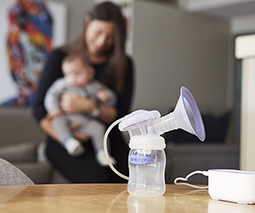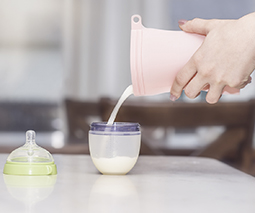Study says supplementing breast milk with formula can sometimes be a good idea

The results of a new study into supplementing breast milk with formula has come up with some findings that are a little confusing. Let us take you through them.
Six of one, half a dozen of the other?
The study tracked the long-term feeding habits of 164 babies. The babies were breastfed between 1-to-3 days old, but their post-birth weight loss was in the 75th percentile or above for age.
Half of the mothers fed their babies syringe-fed formula after each breastfeeding, but stopped doing that when their milk came in at between day two and day five after delivery. The other half of the mums continued to breastfeed exclusively.
The study found that at six months of age, the babies in the formula-supplemented group were as likely to breastfeed as those who had been exclusively breastfed.
But by 12 months of age things had shifted. Only 30 percent of the babies in the formula-supplemented group were still breastfeeding. In the exclusively breastfed group, 48 percent were continuing to breastfeed.
Clear as mud
An earlier study of the same 164 babies found, there may be benefits to supplementing with formula. Supplemented newborns may have been at lower risk for something called hyperbilirubinemia, a condition that leads to jaundice and which they think might be caused by inadequate nutrition.
Science Daily reports that these findings show formula might have a place in the diets of some newborns.
“Our study’s results show that early, limited formula may have significant benefits as well as risks for subsequent breastfeeding duration,” study author Valerie Flaherman MD, a paediatrician at UCSF Benioff Children’s Hospitals said.
“Counselling that implies all formula is harmful would be inaccurate and may be detrimental to long-term breastfeeding success,” she said.
But if formula is used in the first few days after birth to improve the health of an unwell or struggling baby, “it should be discontinued as soon as possible, since ongoing use at 1 week of age indicates a mother is at high risk of early breastfeeding cessation,” Flaherman said.
Science Daily reports that study senior author Ian M. Paul, MD, of Penn State College of Medicine, discouraged a ‘rigid one-size-fits-all approach’.
He said that this data should be balanced with “how best to support babies and their mothers.”
In the end, mums should do what works for them, making sure that they prioritise their own health as well as their babies.









